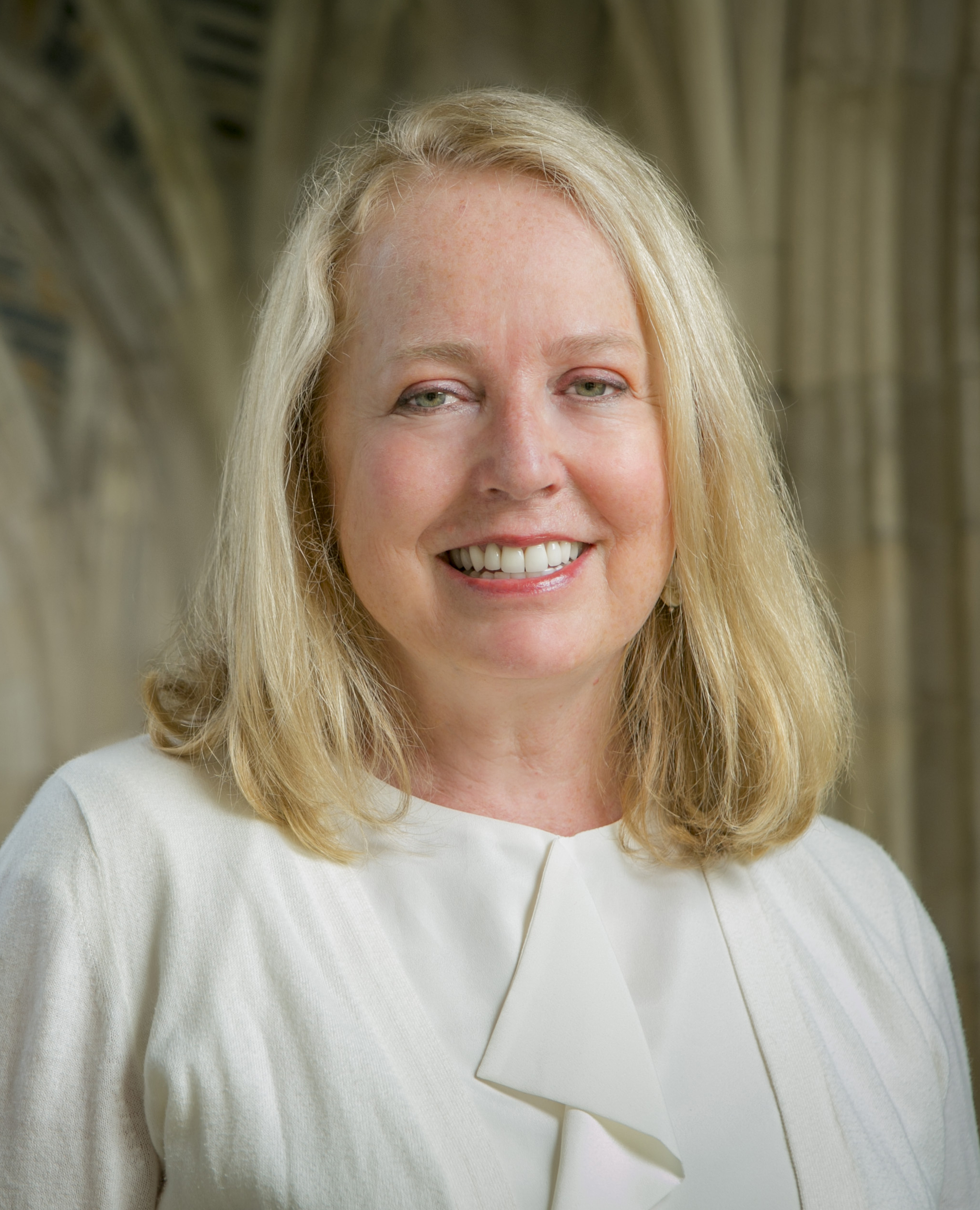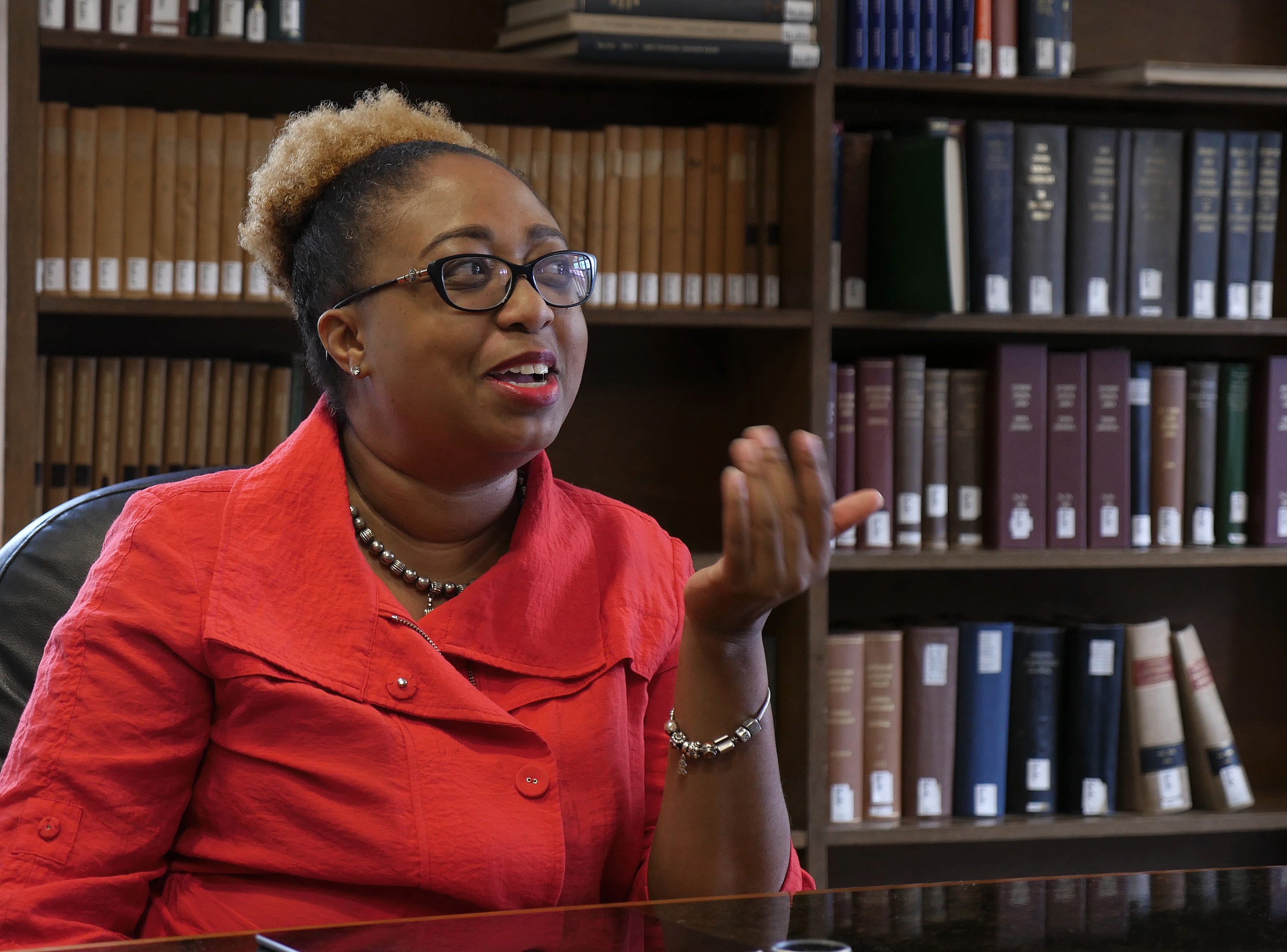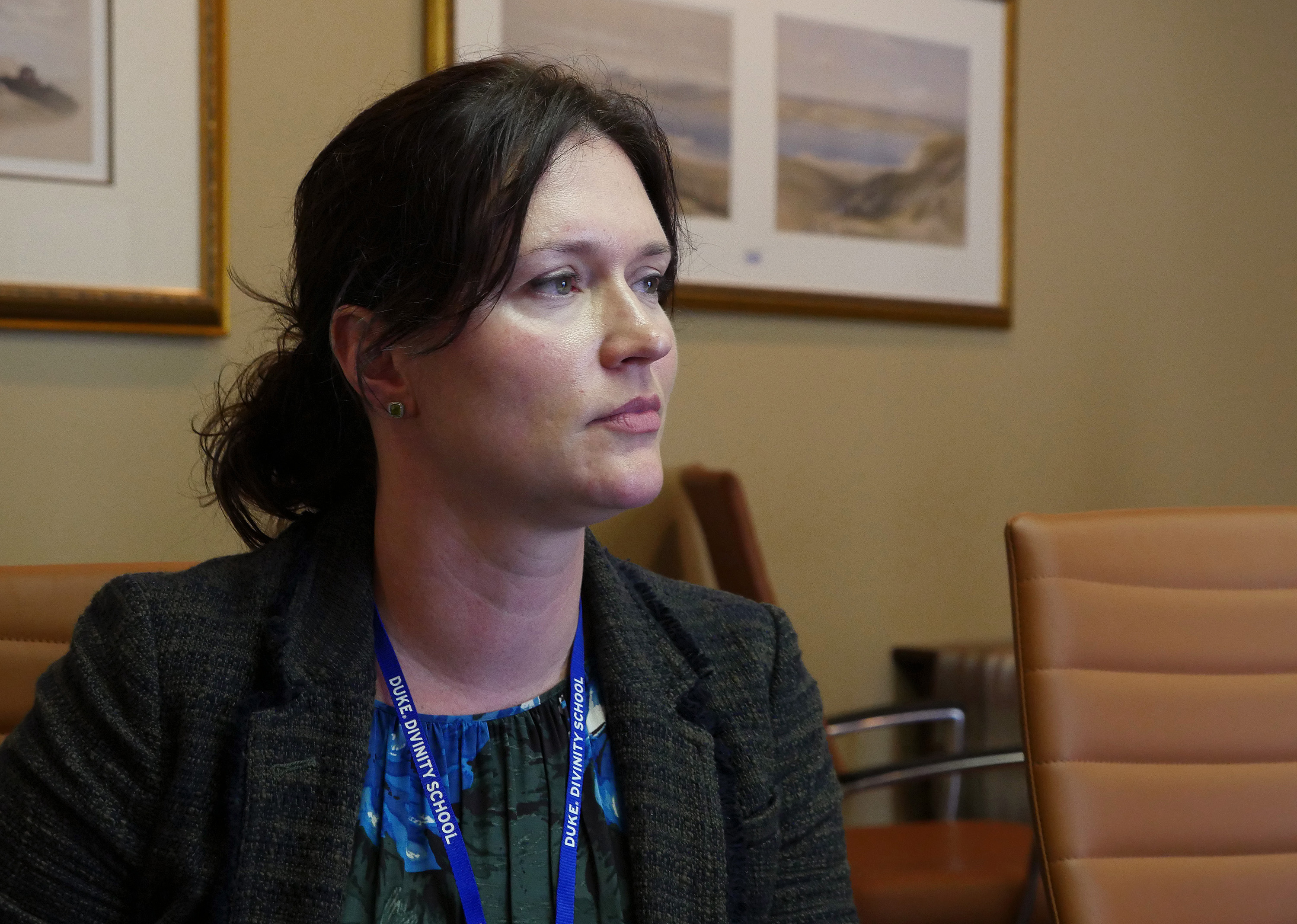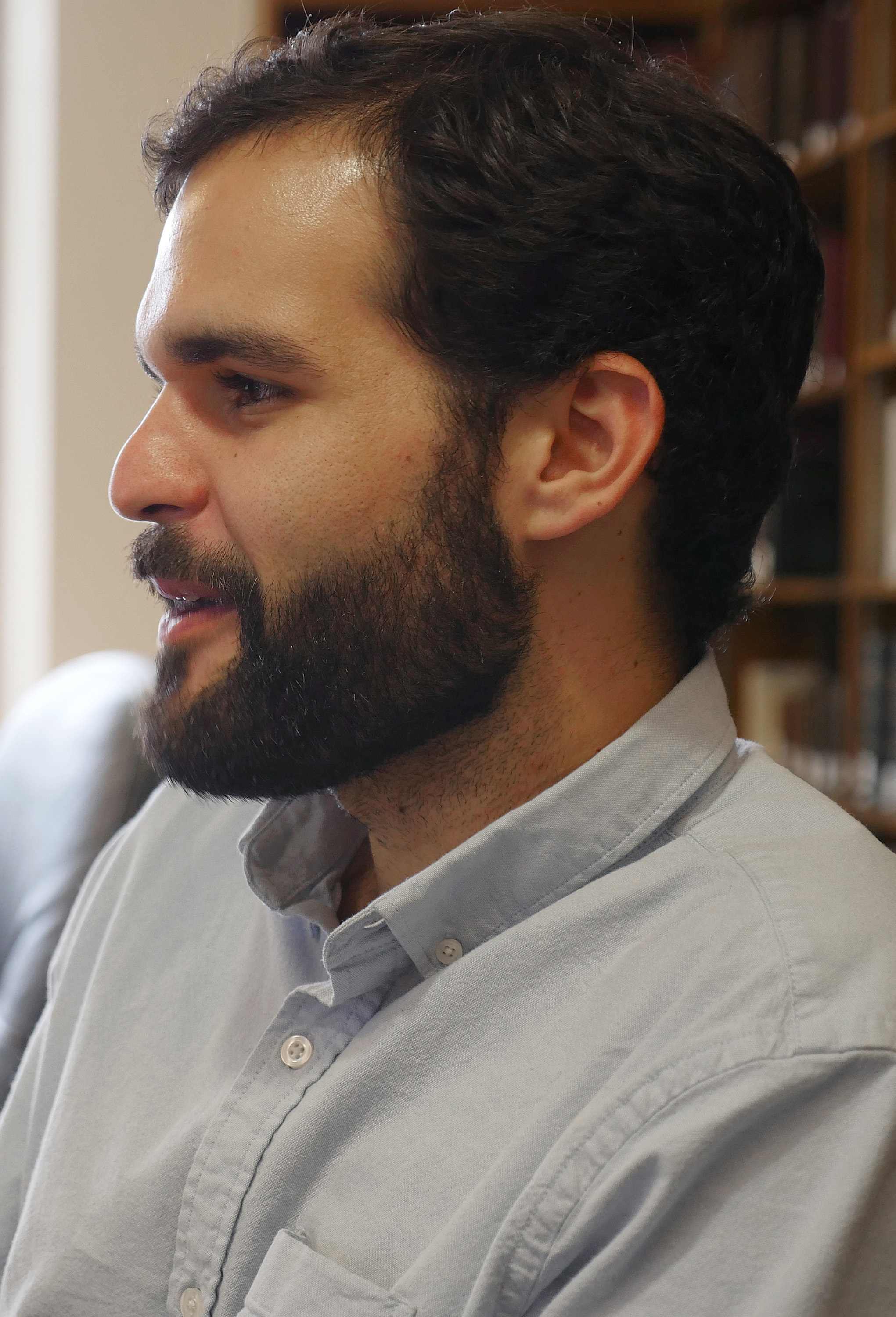The Rev. Elaine Heath started her tenure as dean of Duke Divinity School with a pledge to build diversity and increase equity at the primarily white, historic Southern school.

The Rev. Elaine Heath, dean of Duke Divinity School and professor of missional and pastoral theology. Photo © Duke Photography
One of her first steps was to bring Racial Equity Institute training to the divinity school for faculty, staff and students.
That didn’t turn out so well.
An email brawl broke out between some professors, a brawl made public in an internet blog. One professor urged his colleagues to ignore the training request because it would be a “waste of time.” That professor has since resigned.
The blog sparked other articles that questioned whether Duke Divinity School really was interested in diversity or was just being politically correct.
Less than a year into her tenure, as one student put it, “Heath has been dealt a difficult hand.”
Students have felt the fallout, said Amy Scoggin, a rising third-year master of divinity student. Scoggin, who is Latina, is on track to be a United Methodist provisional elder in the Florida Annual Conference.
“When things administratively seem chaotic because of influx of so many articles, what are we supposed to believe? Where do we get our information?” she asked in an interview with United Methodist News Service.
When Scoggin attended the Florida Annual Conference in June, she was approached by Duke alumni, who asked her, “What’s going on at Duke Div?”
profiles of diversity at Duke
Five students from different faith backgrounds talk about diversity and the controversary surrounding recent media reports. Read more
“My friends are hurt to know that groups of professors or one professor think racial equality training is a waste of time,” she said. “To see the dean’s response that racial equality is a priority … that was great.”
Joseph Robbins, a rising senior who is African-American, said he personally has not experienced discrimination.
“But I have had classmates who have undergone it and for that I am painfully sorry,” he added.
“I think some of the problems we are experiencing are necessary for our formation, shaping us to be strong critical thinking Christian leaders. I do think some of the articles (recent news reports) are a bit hyperbolic in nature, some of them are stretching it, but we do have our problems.”
Betsy Poole, director of Annual Giving and Major Gifts Officer, noted that Heath has been at the school for less than a year. She said the irony of the current situation is that the faculty know Heath has set diversity and equality as her top priorities.
“We do not have our heads in the sand, the school does not, the leadership does not,” Poole said. “There are a lot of people who care about trying to make things better.”
In 2015, two leading African-American faculty members — Willie James Jennings and Eboni Marshall Turman — left Duke for positions at Yale.
“That was just a big blow,” Poole said. She said there are three faculty positions open and they will probably all be filled by people of color.

Jackie Scott, Master of Divinity student from St. Louis, is doing her summer field education at Duke Memorial United Methodist Church in downtown Durham, N.C. Photo by Kathy L. Gilbert, UMNS.
Jackie Scott, a Master of Divinity student who is African-American, said there is great interest on campus in having a more diverse faculty.
“We have an Office of Black Church Studies but that doesn’t replace having professors who have that black church perspective. I think the students are just saying, ‘Hear us,’ ” Scott said.
There have been protests by the Black Seminarians Union and other students — one at Heath’s convocation.
The group issued an appeal to the administrative, faculty and student leadership to respond to “continued injustice upon black/brown bodies in our country” after several high-profile shootings.
Heath said she has had “numerous” meetings with African-American student groups including a monthly brown-bag lunch with the Black Seminarians Union.
The United Methodist Board of Higher Education and Ministry’s Young Clergy Initiative awarded the divinity school an $80,000 grant.
Heath plans to use the money primarily for field education placements for African-American students in African-American contexts.
Another step Heath has taken is to order a research project on the history of racial tension at the seminary. She wants to develop a preliminary plan for systemic change that includes faculty, staff, students and external constituencies such as alumni and the church.
Heath said search committees are looking for candidates for a senior, tenured position in African-American theology and ethics and a tenured position as faculty director of the Office of Black Church Studies.
At the moment, the racial breakdown of faculty includes six African-Americans, one Latino, two Asian and 33 white/Caucasian. Of the 42 positions, 14 are women and a fifteenth — homiletics professor the Rev. Jerusha Neal — starts in July, Heath said.
The student body is 68 percent white, 16 percent African-American, 1 percent Native American, 1 percent Asian, 4 percent Hispanic/Latino and 5 percent none specified.
Creating a culture change “gets messy,” said Dina Helderman, director of events management department.
“Dean Heath will tell you she had a calling to be here,” she added.

Liz DeGaynor was first a student and is now a member of the faculty. Photo by Kathy L. Gilbert, UMNS.
Liz DeGaynor, associate director, Master of Arts in Christian Practice, has the unusual perspective of coming to the school first as a student and then joining the faculty.
Duke being primarily a white institution in the South is not a new issue, she said.
“It makes me sad that the national news picked up on that part of the story and not on the parts of the life of this institution that are good and faithful,” she said.
The Rev. Randy L. Maddox, William Kellon Quick Professor of Wesleyan and Methodist Studies, talked about the challenges and advantages of being part of Duke University.
Because the seminary is part of Duke University, which has a nationally ranked basketball team, the divinity school has “the youngest student body on average of all the United Methodist schools. It is a strength and a challenge,” he said.
He said younger students “haven’t learned to settle for the way things are.”
“Those of us who have been in the church for a while realize the ‘already’ is offset by ‘how much is not yet.’ ”
The Rev. Edgardo Colón-Emeric, assistant professor of Christian Theology, said for several years Duke Divinity School was flourishing while United Methodist annual conferences were experiencing decline.
“The decline of the denomination is impacting us in a way that didn’t use to be the case when it comes to matters of enrollment, finances. We are also facing the challenges of being in some ways a seminary instituted by a mainline (denomination) and how to flourish in a time when mainlines are not.”
Duke Divinity School has tremendous potential to continue to be a leader in helping Christians think about their place in the world, said Norman Wirzba, professor of theology, ecology and agrarian studies and senior fellow at the Kenan Institute for Ethics Office.
“We are in a period where we are transiting and transitions are difficult, painful,” he said.
Dr. Warren Kinghorn, associate research professor of Psychiatry and Pastoral and Moral Theology, said anyone who is wondering about Duke should “come during the academic year to be a part of what we are doing.”
“What you will find is people working hard to read scripture faithfully, working hard to understand what it means to proclaim the Gospel of Jesus Christ, working hard to connect to the church and to contribute to the upbuilding of the church,” he said. “None of that is easy and none of that is simple all of that is a matter of ongoing hard conversation but that’s what we are about.”
The Rev. McKennon Shea, ordained elder in the Virginia Conference and a fund officer at the seminary, said the divinity school values its place at the university.
“But we are a Christian seminary. We are not a school of religion. We are a place that takes seriously the life and death and resurrection of Jesus Christ,” he said. “We care about being diverse, but by being a Christian seminary we are in service and witness to triune God, that makes us a different kind of higher education institution.”

Adam Perez, a second-year doctoral student at Duke Divinity School. Photo by Kathy L. Gilbert, UMNS.
Heath said when she interviewed for the position, the search committee made it clear that building diversity and increasing equity were top priorities.
“Because I have for many years, worked, lived and worshipped in multicultural and multiracial contexts, I welcomed this priority and have gladly given myself to this work.
“Valuing and promoting diversity is not about being politically correct,” she said. “It is about being Christian and honoring God's multicultural vision of the new creation.”
And as Adam Perez, a doctoral student at the divinity school, pointed out, “a diverse faculty and student body blesses all of us.”
Gilbert is a multimedia report for United Methodist News Service. Contact Gilbert at 615-742-5470 or [email protected]. To read more United Methodist news, subscribe to the free Daily or Weekly Digests.
Like what you're reading? Support the ministry of UM News! Your support ensures the latest denominational news, dynamic stories and informative articles will continue to connect our global community. Make a tax-deductible donation at ResourceUMC.org/GiveUMCom.







